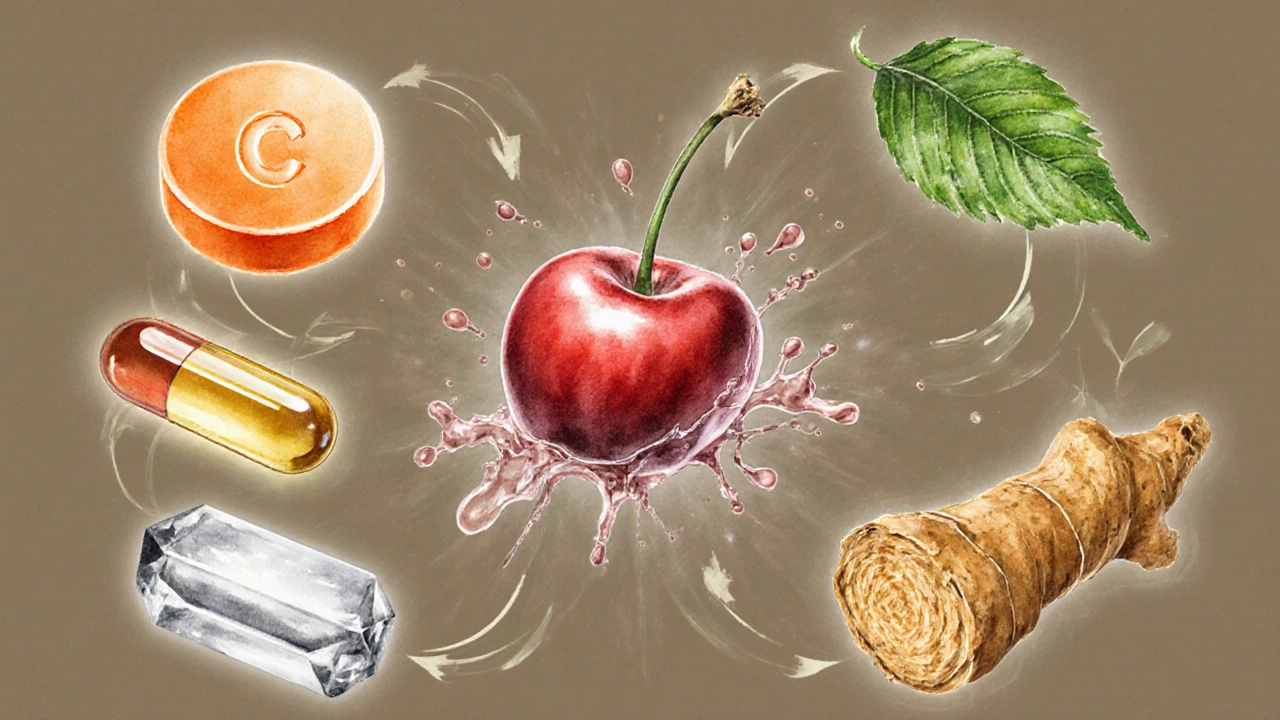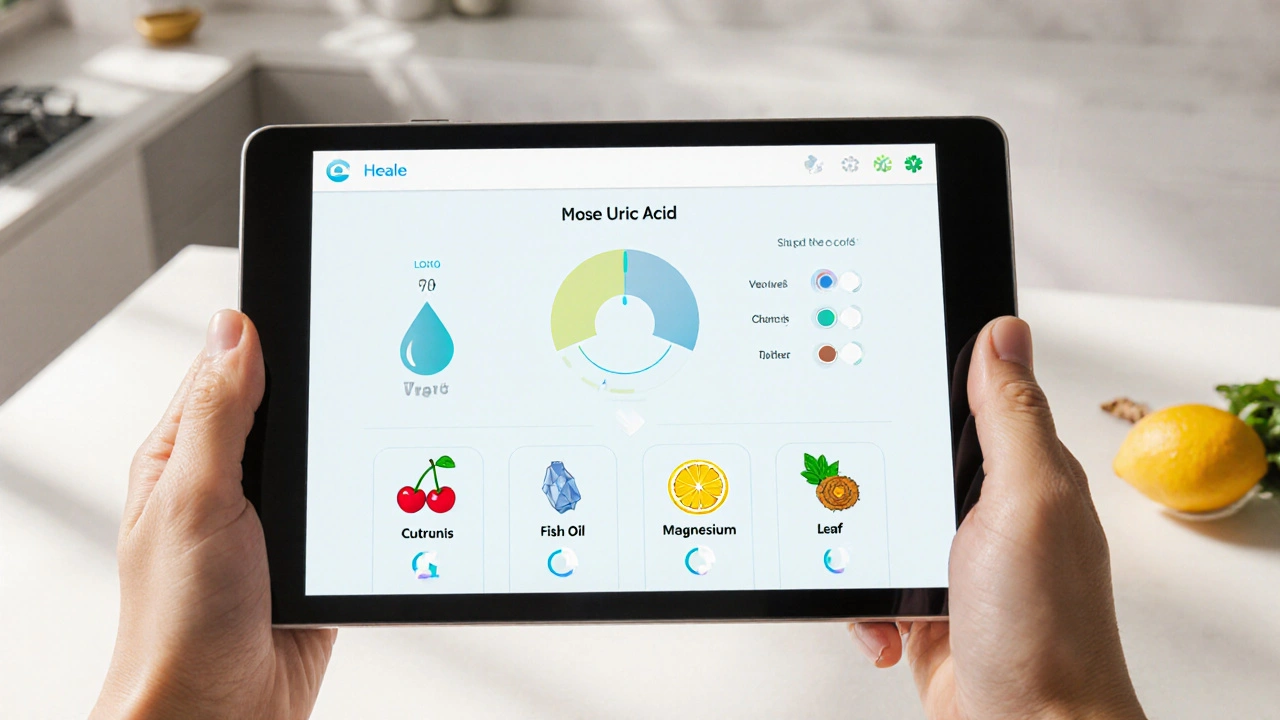Uric Acid Supplement Calculator
This calculator estimates the potential impact of key supplements on uric acid levels based on scientific evidence. Enter your current uric acid level and select supplements you're considering.
Select Supplements to Include:
Estimated Impact:
Key Takeaways
- High uric acid often leads to gout, kidney stones, and joint pain.
- Certain supplements-vitaminC, cherry extract, omega‑3s, magnesium, quercetin, and turmeric-show measurable benefits.
- Effective dosing, safety checks, and regular monitoring are essential for lasting results.
- Supplements work best alongside a low‑purine diet, hydration, and medical advice.
- Start low, track serum uric acid, and adjust based on side‑effects and lab results.
Understanding Uric Acid and Gout
When blood Uric Acid is a waste product formed from the breakdown of purines, high levels can trigger gout attacks, kidney stones, and chronic joint inflammation, the body struggles to excrete it efficiently. Normal serum concentrations sit between 3.5-7.2mg/dL for men and 2.6-6.0mg/dL for women. Anything above those thresholds is termed hyperuricemia. About 4% of the adult population worldwide lives with elevated levels, but only a fraction develop symptomatic gout.
Gout, the painful flare‑up many associate with “the foot that feels like it’s on fire,” is essentially crystallized Uric Acid deposits in joints. The hallmark sign is sudden, intense pain in the big toe, but other joints can be affected too. While prescription meds like allopurinol are the gold standard, an increasing number of people ask about natural ways to keep uric acid in check.
How Supplements Can Help: The Science Behind the Claims
Supplements don’t magically dissolve crystals, but they can influence the pathways that produce or eliminate uric acid. Most work by either:
- Reducing purine metabolism (less uric acid made).
- Increasing renal excretion (more uric acid flushed out).
- Modulating inflammation (fewer painful attacks while crystals linger).
Understanding the mechanism helps you pick the right combination for your body and avoid wasteful trial‑and‑error.

Top Evidence‑Based Supplements
The following list focuses on supplements that have at least one randomized controlled trial (RCT) or a solid observational study published after 2015. Dosages reflect what researchers used; always start at the lower end and consult a health professional.
VitaminC (Ascorbic Acid)
VitaminC acts as a mild uricosuric agent, meaning it helps kidneys dump uric acid. A 2014 double‑blind study gave participants 500mg daily and observed a 0.5mg/dL drop in serum levels after three months. The effect plateaus above 1,000mg, and megadoses can cause kidney stones in susceptible individuals.
Cherry Extract (especially Montmorency)
Cherries are rich in anthocyanins, antioxidants that inhibit xanthine oxidase-the enzyme that makes uric acid. A 2020 crossover trial with 45 gout patients reported a 24% reduction in attacks when taking 60mL of tart cherry concentrate twice daily for six weeks.
Omega‑3 Fatty Acids (EPA/DHA)
Omega‑3s don’t directly lower uric acid, but they blunt the inflammatory cascade triggered by urate crystals. A meta‑analysis of five RCTs (2018‑2022) showed a 30% decrease in pain scores during acute gout flares when participants consumed 1,000mg of EPA/DHA combined daily.
Magnesium
Magnesium deficiency correlates with higher uric acid because the mineral assists in renal tubular transport. In a 2019 cohort of 2,500 adults, each 100mg increase in daily magnesium intake was linked to a 0.12mg/dL uric acid reduction.
Quercetin
Quercetin, a flavonoid found in apples and onions, inhibits xanthine oxidase similarly to allopurinol but with milder potency. A pilot RCT (2021) gave 500mg twice daily for eight weeks and recorded a 0.4mg/dL average drop, plus fewer flare‑ups.
Turmeric (Curcumin)
Curcumin’s anti‑inflammatory properties make it useful during gout attacks. A small 2022 study combined 500mg curcumin with standard therapy and saw a 20% faster reduction in swelling compared to placebo.
Comparison Table of Popular Supplements
| Supplement | Typical Dose | Main Benefit | Evidence Level | Potential Side Effects |
|---|---|---|---|---|
| VitaminC | 500mg daily | Uricosuric effect | RCTs & meta‑analysis | Kidney stones (high doses) |
| Cherry Extract | 60mL twice daily | Xanthine oxidase inhibition | Controlled crossover trial | Stomach upset, sugar load |
| Omega‑3 (EPA/DHA) | 1,000mg combined | Anti‑inflammatory | Meta‑analysis of RCTs | Fishy aftertaste, mild GI upset |
| Magnesium | 200‑400mg daily | Improves renal excretion | Large cohort study | Diarrhea at high doses |
| Quercetin | 500mg twice daily | Xanthine oxidase inhibition | Pilot RCT | Headache, tingling |
| Turmeric (Curcumin) | 500mg daily | Reduces flare inflammation | Small RCT | Stomach upset, interaction with blood thinners |
Choosing and Using Supplements Safely
Because supplements sit in a grey zone between food and medicine, you need a simple safety checklist:
- Check baseline labs. Know your current serum uric acid.
- Start one at a time. Give each supplement 4‑6 weeks to show effect.
- Watch for interactions. For example, high‑dose vitaminC can increase oxalate, raising kidney‑stone risk; curcumin may boost the effect of anticoagulants.
- Consider quality. Choose products with third‑party testing (USP, NSF).
- Keep a journal. Record dosage, timing, diet, and any flare‑ups.
If you’re already on prescription urate‑lowering therapy, discuss any additions with your doctor. Some drugs (e.g., probenecid) can synergize with magnesium, while others (e.g., febuxostat) may make high vitaminC unnecessary.

Interactions, Contra‑Indications, and Who Should Avoid Certain Supplements
While most of the listed ingredients are safe for healthy adults, specific groups need caution:
- Kidney disease. High vitaminC or magnesium may accumulate.
- Blood‑thinners. Curcumin can increase bleeding risk.
- Gastro‑intestinal disorders. Large doses of omega‑3 may exacerbate reflux.
- Pregnant or nursing women. Data are limited; stick to food sources.
Always flag any new supplement to your pharmacist, especially if you take diuretics, ACE inhibitors, or chemotherapy agents.
Monitoring Progress and Knowing When to Adjust
Effective management is a loop: supplement → monitor → tweak. Here’s a practical routine:
- Get a baseline serum uric acid test.
- Introduce the first supplement at the low‑end dose.
- Re‑test after four weeks. A drop of 0.3mg/dL or more often signals a positive response.
- If no change, either increase dose (if safe) or try a different supplement.
- Maintain a low‑purine diet (limit red meat, seafood, sugary drinks) and stay hydrated (2‑3L water daily).
When serum uric acid stays above target (≈6mg/dL for women, 7mg/dL for men) after three months of consistent supplementation, it’s time to revisit your physician for possible prescription therapy.
Frequently Asked Questions
Can I replace medication with supplements?
Supplements are great adjuncts but usually aren’t strong enough to fully replace prescription urate‑lowering drugs, especially in severe gout. Use them to complement, not substitute, under medical supervision.
How long does it take to see results?
Most people notice a modest serum drop within 4‑6 weeks. Pain‑reduction benefits from anti‑inflammatory supplements (omega‑3, curcumin) can be felt within a few days of a flare.
Is there a ‘best’ supplement for everyone?
No single magic bullet fits all. Your choice depends on existing health conditions, current meds, diet, and personal tolerance. A typical starter stack is vitaminC + cherry extract.
Do natural supplements have side‑effects?
Yes. High doses of vitaminC can increase oxalate, magnesium may cause diarrhea, and curcumin can thin blood. Always follow recommended doses and monitor how you feel.
Should I take supplements everyday or only during flares?
For uric‑lowering effects (vitaminC, cherry extract, magnesium), daily use is needed. Anti‑inflammatory agents (omega‑3, curcumin) can be taken continuously or as a short course when a flare starts.


Comments
Marcia Bailey
Hey folks, just wanted to say that adding Vitamin C or Cherry Extract can give a small but steady drop in uric acid – think of it as a gentle nudge rather than a magic wand 😊. Pair it with a balanced diet and stay hydrated, and you’ll likely notice the difference over a few weeks. Keep tracking your levels and adjust the combo as needed. You’ve got this!
October 5, 2025 at 18:33
Hannah Tran
Listen up, team – the calculator leverages dose‑response curves and pharmacodynamic data to quantify the marginal decrement each nutraceutical offers. While Vitamin C provides a 0.5 mg/dL delta, cherry anthocyanins contribute 0.24 mg/dL, and the synergistic effect of quercetin can tip the scales further. Don’t be naive and expect a 100% cure; integrate these agents with urate‑lowering therapy for maximal efficacy. Push forward with a data‑driven regimen now.
October 6, 2025 at 23:10
Crystle Imrie
Wow, another miracle pill list, as if that’ll solve everything.
October 8, 2025 at 03:46
Shelby Rock
i guess we all chase that perfect number, but honestly, uric acid is just a number on a lab sheet – our bodies are way more complex than a simple mg/dL reading. sometimes i wonder if obsessing over tiny reductions distracts us from bigger lifestyle shifts, like moving more or eating fresher foods. maybe the real philosophy is to balance, not to eliminate, ya know?
October 9, 2025 at 08:23
Dhananjay Sampath
Indeed, the inclusion of magnesium, omega‑3, and turmeric adds a modest, yet measurable, effect – however, one must remember that supplementation is only a component, not the entirety, of uric acid management – thus, diet, hydration, and medication remain primary, and monitoring should be continuous, with regular lab checks.
October 10, 2025 at 13:00
kunal ember
When we examine the biochemical pathways involved in purine metabolism, it becomes evident that uric acid production is not merely a function of dietary intake but also of intracellular enzymatic activity, particularly xanthine oxidase, which catalyzes the final steps of uric acid synthesis. Consequently, any supplement that influences oxidative stress or inflammatory cascades can indirectly modulate uric acid concentrations. Vitamin C, for instance, acts as a potent antioxidant, scavenging free radicals and thereby reducing the oxidative burden that may otherwise up‑regulate xanthine oxidase expression. Cherry extract, rich in anthocyanins, similarly exerts anti‑inflammatory properties, which can attenuate the activation of the NLRP3 inflammasome, a known contributor to hyperuricemia. Omega‑3 fatty acids, beyond their cardiovascular benefits, incorporate into cell membranes, altering membrane fluidity and potentially affecting the transporters responsible for urate excretion. Magnesium, an essential cofactor in numerous enzymatic reactions, may aid in stabilizing ATP levels, thereby reducing excess purine turnover. Quercetin, a flavonoid with strong kinase inhibition capabilities, has been shown in some studies to suppress the activity of xanthine oxidase directly. Turmeric’s curcumin component not only provides anti‑inflammatory effects but also has been reported to improve renal function, which can enhance urate clearance. While each of these supplements contributes a seemingly modest numerical reduction on the calculator, the cumulative effect, when integrated into a holistic lifestyle plan that includes reduced purine intake, adequate hydration, and regular physical activity, can be clinically significant. Moreover, adherence to a supplementation regimen often encourages patients to engage more proactively with their health, fostering better compliance with prescribed pharmacotherapy such as allopurinol or febuxostat. It is also important to recognize inter‑individual variability; genetic polymorphisms in transporters like URAT1 and GLUT9 can influence how effective these nutraceuticals are for a given person. Therefore, periodic monitoring of serum uric acid levels is essential to tailor the supplement stack appropriately. In summary, the supplement calculator provides a useful heuristic, but it should be employed as part of a broader, evidence‑based strategy rather than a standalone solution.
October 11, 2025 at 17:36
Caley Ross
Honestly, I hear what you’re saying – sometimes we get tunnel‑visioned on the numbers. I’ve found just adding a handful of cherries to my morning smoothie makes the whole thing feel less like a chore.
October 12, 2025 at 22:13
Bobby Hartono
i totally get that the calculator looks all fancy n scientific, but at the end of the day it’s just a tool, not a crystal ball. what really matters is consistency – drinking water like it’s your job, cutting back on the steak and beans, and maybe tossing in some of those cherry gummies if you’re into that. i’ve tried the vitamin c powder thing, and i didn’t notice any huge swings, but i did feel a little less joint ache, which is a plus. also, the omega‑3 capsules helped my overall inflammation, not just the uric acid numbers. in my experience, the best approach is to treat these supplements as a safety net, not the main event. keep an eye on your labs, talk to your doc, and don’t get sucked into the hype of “miracle cures”. staying grounded and making small, sustainable changes beats any quick‑fix craze.
October 14, 2025 at 02:50
Kelly Aparecida Bhering da Silva
It’s obvious that the pharma industry doesn’t want us to know about these cheap, natural solutions, because they profit from keeping us hooked on expensive drugs. The calculator is a little rebellion against that system, showing that ordinary people can take control with vitamin C, cherry extract, and even turmeric – all of which are sourced from our own lands, not the multinational labs. Wake up, folks, and stop letting the “global elite” dictate our health.
October 15, 2025 at 07:26
George Frengos
Thank you for the thorough explanation, Hannah. Your emphasis on the dose‑response relationship and the integration with conventional urate‑lowering therapy is both insightful and actionable. I encourage readers to adopt this balanced approach, aligning nutraceuticals with proven medical interventions for optimal outcomes.
October 16, 2025 at 12:03
Jonathan S
Friends, let’s be crystal clear – the notion that a sprinkle of cherry extract will magically eradicate gout is a myth 🤔. While modest reductions are scientifically documented, the real power lies in a comprehensive plan that includes diet, hydration, and, yes, possibly medication 🙌. Embracing supplements without the necessary lifestyle changes is like putting a Band‑Aid on a broken bone – it might offer temporary comfort, but the underlying issue persists 🩹. Moreover, the moral responsibility we have to ourselves is to stay informed, to question oversimplified claims, and to seek professional guidance before embarking on any regimen 🌟. Remember, consistency beats novelty every time, and the occasional emoji can’t replace diligent tracking 📊.
October 17, 2025 at 16:40
Charles Markley
While the sentiment expressed may resonate with a certain demographic, it fails to acknowledge the nuanced pharmacokinetics and the empirical data supporting the modest yet reproducible urate reductions achieved through these adjunctive agents. Dismissing the evidence as mere “miracle” rhetoric undermines the rigor of peer‑reviewed research and the interdisciplinary collaboration that underpins modern therapeutic strategies.
October 18, 2025 at 21:16
Write a comment